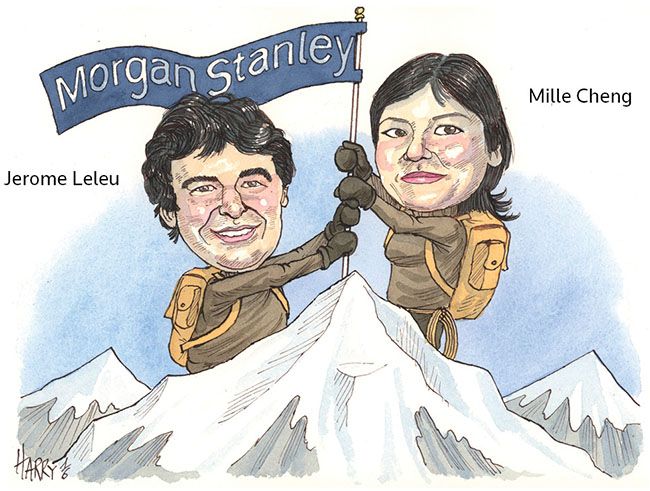Going postal
Asian equity offerings proved a tough sell in 2016, but one bank used its global relationships to full advantage, raising more for its clients than any of its peers. For its consistent leadership in difficult markets, Morgan Stanley is IFR’s Asia-Pacific Equity House of the Year.
Morgan Stanley added to an already impressive track record in 2016 with a steady stream of high-profile equity offerings, navigating extreme market volatility and raising more capital than any other bank.
While rivals were struggling to make ends meet, Morgan Stanley rose to the top of the underwriting league tables and made money in the process. It focused on situations where it could play a leading role, investing resources selectively in jumbo IPOs and working hard on block trades from repeat clients.
“We are leaner than a lot of our competitors, which means we have to be very disciplined in taking on mandates,” said Jerome Leleu, co-head of Asia-Pacific equity capital markets alongside Mille Cheng.
“We have been focusing on backing the right companies. We can go down in terms of size or go up in terms of risk in situations where we believe the company has a great future.”
Morgan Stanley topped the Asia-Pacific ex-Japan equity and equity-linked league table in the review period, arranging 66 deals to raise a combined US$15.9bn.
Its performance in Chinese offerings was especially impressive, at a time when global investors were still smarting from the 2015 market crash. It was streets ahead of any other global arranger and even managed to out-gun the Chinese banks, now fierce competitors in any IPO.
The targeted approach allowed the bank to continue to print deals in a quiet market, especially in the China IPO space where many of its competitors have been crowded out by Chinese banks.
It was one of the sponsors of the HK$57.6bn (US$7.4bn) IPO of Postal Savings Bank of China, the world’s largest IPO since Chinese e-commerce giant Alibaba Group went public through a US$25bn float in 2014. It also handled the US$1.4bn New York IPO of Chinese delivery company ZTO Express, the largest Chinese listing in the US since Alibaba.
It worked on most of the jumbo Chinese listings in Hong Kong, including the HK$14.7bn IPO of China Energy Engineering, the HK$9.7bn float of China Merchants Securities and the HK$8.7bn listing of BOC Aviation.
Those deals expanded Morgan Stanley’s profile and kept its brokers in the flow, but it was the jumbo blocks and equity-linked deals that really made 2016 its year.
It was one of only two bookrunners to help US insurer AIG raise HK$9.68bn from the sale of part of its stake in PICC Property & Casualty in April. It also single-handedly arranged two sizeable blocks of WH Group, allowing private equity firm CDH to cash in a combined HK$13bn.
On the equity-linked front, Morgan Stanley, as joint bookrunner, introduced a new product to the region – a US$6.6bn offering of mandatory exchangeable trust securities that helped Japan’s SoftBank to monetise the huge gain on its Alibaba shares in a tax-efficient manner and allowed investors to capture both yield and growth.
It also jointly led a US$1.5bn follow-on and a US$900m convertible bond for US-listed Ctrip.com, one of the most lucrative deals of the year.
Outside China, the bank’s presence in other major markets also impressed. It was a joint global coordinator in the US$1.3bn IPO of messenger app Line, a rare US-Japan dual-listing. In Australia, it worked on the A$1bn (US$747m) rights issue of Transurban, and it featured on a handful of meaningful floats in South-East Asia, including the S$902m Frasers Logistics and Industrial REIT IPO, a M$775m (US$198m) block in SapuraKencana Petroleum and the Bt13bn (US$363m) IPO of Star Petroleum.
The S$719m (US$522m) underwritten rights issue for the beleaguered Noble Group, the largest follow-on offering of the year in Singapore, demonstrated Morgan Stanley’s ability to take calculated risks for its clients. The rights issue proved a lifeline for the commodity trader when its accounting standards were under attack and other banks were reluctant to take exposure.
In the fast-growing Indian market, Morgan Stanley was lead manager on PNB Housing Finance’s Rs30bn (US$449m) listing, the second largest IPO of the year. It was also one of three banks hired to manage US$8bn–$9bn of share sales for the government’s Specified Undertaking of Unit Trust of India, covering stakes in Axis Bank, ITC and Larsen & Toubro, ensuring that it will remain in the flow for years to come.
To see the digital version of this review, please click here.
To purchase printed copies or a PDF of this review, please email gloria.balbastro@tr.com



